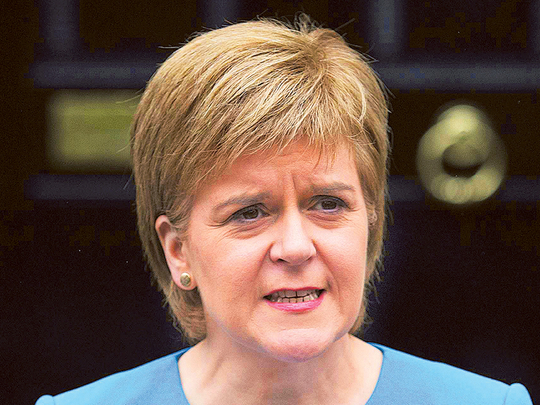
Glasgow: Scottish First Minister Nicola Sturgeon on Thursday unveiled plans for a new independence referendum in case her demands for more autonomy and for Scotland to stay in Europe’s single market are not met.
Sturgeon said she would publish a draft referendum bill next week, accusing the British government of pushing for a “hard Brexit” and stirring up “xenophobia” with proposals to cut EU immigration.
“I can confirm today that the independence referendum bill will be published for consultation next week” in the Scottish parliament, Sturgeon told delegates at her Scottish National Party’s annual conference.
“I am determined that Scotland will have the ability to reconsider the question of independence and to do so before the UK leaves the EU if that is necessary to protect our country’s interest.”
Scotland, which has a semi-autonomous status within Britain, voted by 55 per cent in favour of staying in the United Kingdom in an independence vote in 2014.
In the EU membership referendum earlier this year Scotland voted by 62 per cent in favour of remaining part of the bloc while Britain as a whole voted to leave.
Reacting to Sturgeon’s announcement, a spokesman for Prime Minister Theresa May’s office said: “This issue was addressed in 2014. We should focus on working together on the best deal for the UK”.
May has said she wants to trigger Article 50 of the Lisbon Treaty — the formal process for leaving the EU — by the end of March 2017 at the latest.
That would open up a two year timeline for Britain to negotiate its departure before exiting in 2019.
May was clear during her own Conservative party conference last week that Brexit was not negotiable.
“We voted in the referendum as one United Kingdom, we will negotiate as one United Kingdom, and we will leave the European Union as one United Kingdom,” the premier said.
“There is no opt-out from Brexit. And I will never allow divisive nationalists to undermine the precious union between the four nations of our United Kingdom.”
For an independence vote to be held, the British parliament would also have to give its consent.
Sturgeon said she would publish proposals for Scotland to stay in the single market — a hot-button issue in Britain after government ministers hinted the country may have to leave it if it wants to impose stricter controls on EU immigration.
“Scotland didn’t choose to be in this situation. Your party put us here,” Sturgeon said, addressing May.
“If you think for one single second that I am not serious about doing what it takes to protect Scotland’s interest, think again.”
Sturgeon said the proposals would include Scotland taking powers currently in the EU’s remit as well as seeking new powers from London including the ability to strike international deals and immigration policy.
“If you can’t or won’t allow us to protect our interests in the UK, then Scotland will have the right to decide afresh if it wants to take a different path,” she said.
“There is no rational case for taking the UK out of the single market and there is no authority for it either,” she said, accusing May of “high-handed pronouncements that dismiss Scottish opinion”.
Sturgeon has been a vocal critic of London’s handling of the June 23 referendum and has been increasingly scathing about May’s preparations for Brexit.
“We face a hard Brexit imposed by the hard right of the Tory party,” she told delegates.
“Brexit has become Tory Brexit. The rampant right wing of the party are using it as licence for the xenophobia that has long lain under the surface — but which is now in full, unlovely view”.
She said the prospect of visas for travellers and tariffs for businesses were “clear and present dangers” and Scotland “will fight against it”.
Sturgeon said her party, which has 54 out of 650 seats in Westminster, would seek to form an alliance with other opposition parties against a hard Brexit.
She said SNP MPs would also vote against the “Great Repeal Bill” which May has promised to put forward next year to abolish the European Communities Act — the foundation of Britain’s 43-year EU membership.












